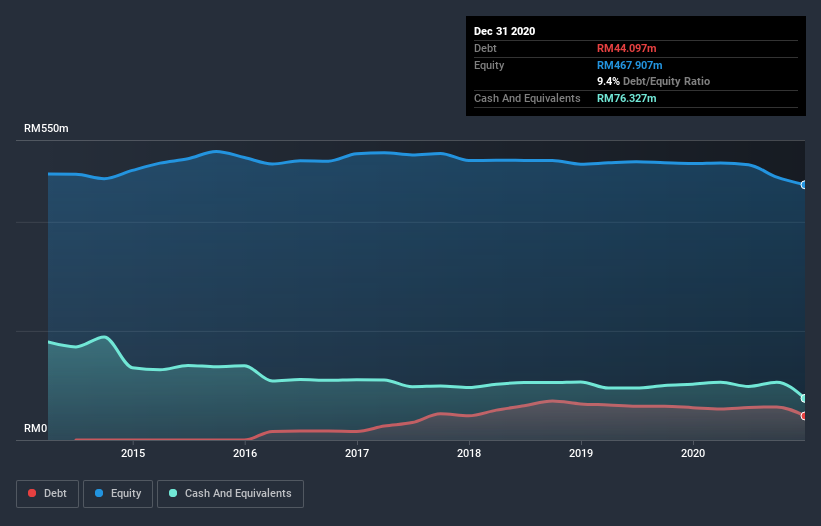Is GUH Holdings Berhad (KLSE:GUH) Using Debt Sensibly?
Howard Marks put it nicely when he said that, rather than worrying about share price volatility, 'The possibility of permanent loss is the risk I worry about... and every practical investor I know worries about.' It's only natural to consider a company's balance sheet when you examine how risky it is, since debt is often involved when a business collapses. We note that GUH Holdings Berhad (KLSE:GUH) does have debt on its balance sheet. But is this debt a concern to shareholders?
When Is Debt A Problem?
Generally speaking, debt only becomes a real problem when a company can't easily pay it off, either by raising capital or with its own cash flow. If things get really bad, the lenders can take control of the business. However, a more common (but still painful) scenario is that it has to raise new equity capital at a low price, thus permanently diluting shareholders. Of course, debt can be an important tool in businesses, particularly capital heavy businesses. The first thing to do when considering how much debt a business uses is to look at its cash and debt together.
View our latest analysis for GUH Holdings Berhad
What Is GUH Holdings Berhad's Debt?
As you can see below, GUH Holdings Berhad had RM44.1m of debt at December 2020, down from RM59.3m a year prior. But on the other hand it also has RM76.3m in cash, leading to a RM32.2m net cash position.

A Look At GUH Holdings Berhad's Liabilities
The latest balance sheet data shows that GUH Holdings Berhad had liabilities of RM86.4m due within a year, and liabilities of RM43.2m falling due after that. Offsetting these obligations, it had cash of RM76.3m as well as receivables valued at RM56.9m due within 12 months. So it actually has RM3.71m more liquid assets than total liabilities.
This short term liquidity is a sign that GUH Holdings Berhad could probably pay off its debt with ease, as its balance sheet is far from stretched. Simply put, the fact that GUH Holdings Berhad has more cash than debt is arguably a good indication that it can manage its debt safely. When analysing debt levels, the balance sheet is the obvious place to start. But it is GUH Holdings Berhad's earnings that will influence how the balance sheet holds up in the future. So when considering debt, it's definitely worth looking at the earnings trend. Click here for an interactive snapshot.
Over 12 months, GUH Holdings Berhad made a loss at the EBIT level, and saw its revenue drop to RM240m, which is a fall of 29%. That makes us nervous, to say the least.
So How Risky Is GUH Holdings Berhad?
We have no doubt that loss making companies are, in general, riskier than profitable ones. And the fact is that over the last twelve months GUH Holdings Berhad lost money at the earnings before interest and tax (EBIT) line. And over the same period it saw negative free cash outflow of RM11m and booked a RM45m accounting loss. With only RM32.2m on the balance sheet, it would appear that its going to need to raise capital again soon. Even though its balance sheet seems sufficiently liquid, debt always makes us a little nervous if a company doesn't produce free cash flow regularly. The balance sheet is clearly the area to focus on when you are analysing debt. However, not all investment risk resides within the balance sheet - far from it. For example GUH Holdings Berhad has 3 warning signs (and 1 which is significant) we think you should know about.
If you're interested in investing in businesses that can grow profits without the burden of debt, then check out this free list of growing businesses that have net cash on the balance sheet.
If you decide to trade GUH Holdings Berhad, use the lowest-cost* platform that is rated #1 Overall by Barron’s, Interactive Brokers. Trade stocks, options, futures, forex, bonds and funds on 135 markets, all from a single integrated account. Promoted
New: Manage All Your Stock Portfolios in One Place
We've created the ultimate portfolio companion for stock investors, and it's free.
• Connect an unlimited number of Portfolios and see your total in one currency
• Be alerted to new Warning Signs or Risks via email or mobile
• Track the Fair Value of your stocks
This article by Simply Wall St is general in nature. It does not constitute a recommendation to buy or sell any stock, and does not take account of your objectives, or your financial situation. We aim to bring you long-term focused analysis driven by fundamental data. Note that our analysis may not factor in the latest price-sensitive company announcements or qualitative material. Simply Wall St has no position in any stocks mentioned.
*Interactive Brokers Rated Lowest Cost Broker by StockBrokers.com Annual Online Review 2020
Have feedback on this article? Concerned about the content? Get in touch with us directly. Alternatively, email editorial-team (at) simplywallst.com.
About KLSE:GUH
GUH Holdings Berhad
An investment holding company, engages in the electronic, property development, and utilities businesses in Malaysia, China, Indonesia, Singapore, and internationally.
Excellent balance sheet and slightly overvalued.
Market Insights
Weekly Picks


Crazy Undervalued 42 Baggers Silver Play (Active & Running Mine)


Fiducian: Compliance Clouds or Value Opportunity?

Willamette Valley Vineyards (WVVI): Not-So-Great Value
Recently Updated Narratives

PRME remains a long shot but publication in the New England Journal of Medicine helps.

This one is all about the tax benefits

Estimated Share Price is $79.54 using the Buffett Value Calculation
Popular Narratives


MicroVision will explode future revenue by 380.37% with a vision towards success


NVDA: Expanding AI Demand Will Drive Major Data Center Investments Through 2026




